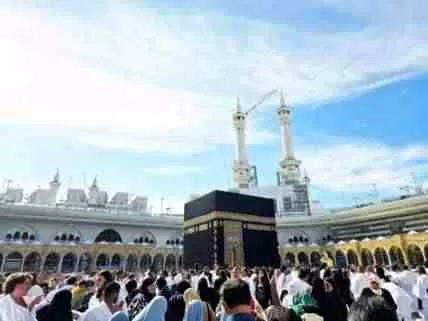Understanding the Quranic concept of pilgrimage also gives you a chance to learn more about this opportunity for believers to transform their lives.
Hajj and Umrah are incredible journeys that are much more than just physical ones. These pilgrimages can transform your life and revive your spirituality and faith like no other thing. This journey of profound spiritual transformation is unmatched and is the dream of every Muslim.
Understanding the Quranic concept of pilgrimage
Hajj and Umrah are both grounded in the Holy Quran. We can learn about their exceptional significance, rewards, and how to perform them through the divine teachings in the Holy Quran. The two pilgrimages have similarities and differences, and learning about them through the Holy Quran clarifies everything. So, if you have availed of Umrah packages 2026 from the UK, you might want to know about the pilgrimage through the Quran. We are here to help you clarify both pilgrimages in the light of the Holy Quran.
Foundation of Pilgrimage in the Holy Quran
• As previously stated, the notion of pilgrimage is profoundly anchored in the sacred verses of the Holy Quran.
• In the Holy Quran, Allah Almighty indicates that the revered cubic edifice in Makkah, the Holy Kaabah, serves as the inaugural house of worship for humanity.
• “Indeed, the first House [of worship] established for mankind was that at Bakkah blessed and a guidance for the worlds.” (Surah Aal Imran 3:96)
• Furthermore, the Holy Quran clarifies that this pilgrimage is a divine mandate rather than a human-constructed ritual.
• It traces back to the era of the Prophet Ibrahim (AS), when the Almighty commanded him to erect this cubic structure as a place of worship for all of humanity.
• “And proclaim to the people the Hajj [pilgrimage]; they will come to you on foot and on every lean camel; they will come from every distant pass.” (Surah Al-Hajj 22:27)
Quran by Call academy offers online classes of
1-Quran ( Reading & Memorization )
4- Arabic ( speaking & writing & Reading
About Hajj: The Obligatory Pilgrimage
Hajj is an obligation of all Muslims to the Almighty. Anyone physically and financially capable must perform this pilgrimage at least once in their lifetime. It is also one of the five pillars of Islam that explains the significance of this incredible pilgrimage. Hajj is performed on specified dates in Dhul Hijjah. Every year, pilgrims arrive at the holy city of Makkah from the 8th to the 13th of Dhul Hijjah.
Hajj in the Light of the Quran
The Holy Quran references the Hajj more frequently than the Umrah. The sacred text explicitly indicates that this pilgrimage is mandatory for all Muslims. It is crucial to understand that this pilgrimage encompasses both a physical and a spiritual journey. It serves as a path for spiritual contemplation, revitalization of faith, repentance, and renewal.
“And complete the Hajj and Umrah for Allah…”
(Surah Al-Baqarah 2:196)
“That [is so]. And whoever honors the symbols of Allah indeed, it is from the piety of hearts.”
(Surah Al-Hajj 22:32)
Each ritual of Hajj carries profound spiritual significance that imparts valuable lessons about spirituality within Islam. Additionally, it provides a remarkable opportunity to explore Islamic history. As you engage in Tawaf, Sa’i, sacrifice, stoning of the devil, and all other Hajj rituals, you will be honoring Prophet Ibrahim (AS) and his family. This extraordinary experience allows you to recognize that the origins of Hajj trace back to the era of Prophet Ibrahim (AS), well before the advent of Islam.
About Umrah: The Voluntary Pilgrimage
Umrah is also known as the lesser pilgrimage. It would be wrong to say that it is a version of Hajj, but it is not restricted to a specific time and has fewer rituals than the obligatory pilgrimage. It is essential to remember that it is not a substitute for Hajj. If you are eligible for Hajj, you must perform it to fulfil your obligation to the Almighty. Even though it is not obligatory.
For Muslims in the UK, choosing the right umrah packages can make the journey more comfortable and spiritually fulfilling, offering convenient options for travel, accommodation, and guided rituals.
The Quran references Umrah alongside Hajj, which shows its importance.
“And complete the Hajj and Umrah for Allah…”
(Surah Al-Baqarah 2:196)
The rituals of Umrah also reflect the journey of the struggles of Hajar, the wife of Prophet Ibrahim (AS), who teaches us many life lessons through her exceptional story.
Themes From the Quran Reflected in the Pilgrimage
-
Unity and Equality
No act of worship reflects the lessons of unity and equality like the pilgrimage. Once you are at the Holy Kaabah, you must shed your worldly individuality as everyone is equal in the eyes of the Almighty. Whether you are a king of your land or the servant to a king, you will be standing with all your other brothers in Islam, wearing the same clothes. This fosters the bond of unity and equality among the pilgrims.
“O mankind, indeed We have created you from male and female and made you peoples and tribes that you may know one another…”
(Surah Al-Hujurat 49:13)
-
Submission to Allah’s Will
The pilgrimage is undoubtedly about submitting to Allah’s will. As soon as you embark on the journey and enter the state of Ihram, you will be doing everything to please the Almighty. This echoes the Quranic principle of Islam, the complete submission to Allah Almighty.
“And take provisions, but the best provision is taqwa.”
(Surah Al-Baqarah 2:197)
Summing Up
Hajj and Umrah are the two most transformative acts of worship. If you need spiritual revival and transformation in your life, it is time to book your Umrah package and start planning this incredible spiritual retreat. You will be amazed to see how this pilgrimage influences your life. Learn more about Hajj and Umrah from the Holy Quran to understand their significance.

